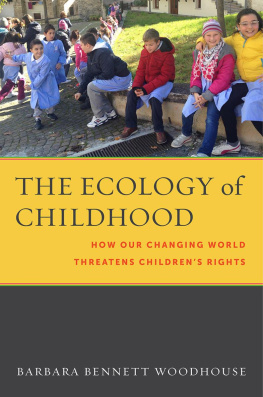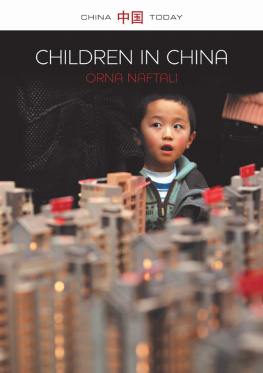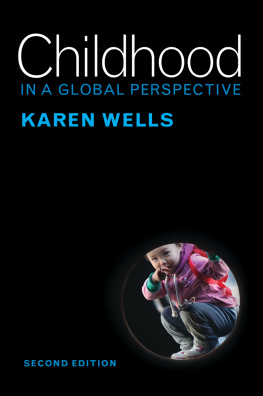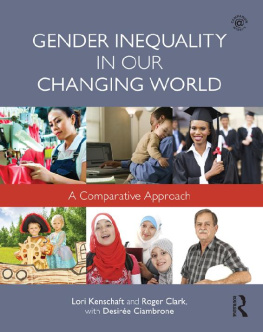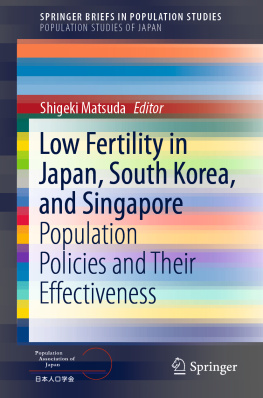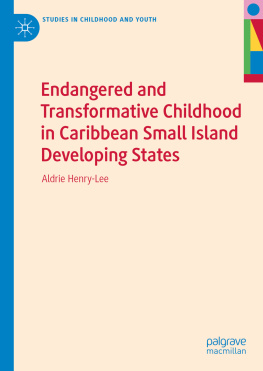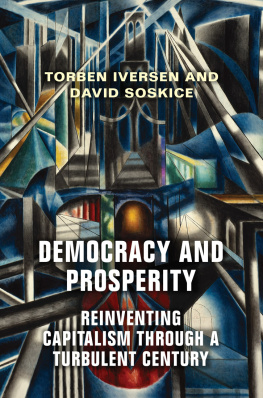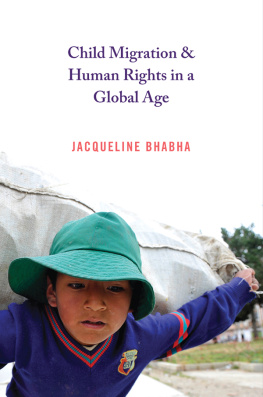THE ECOLOGY OF CHILDHOOD
FAMILIES, LAW, AND SOCIETY SERIES
General Editor: Nancy E. Dowd
Justice for Kids: Keeping Kids Out of the Juvenile Justice System
Edited by Nancy E. Dowd
Masculinities and the Law: A Multidimensional Approach
Edited by Frank Rudy Cooper and Ann C. McGinley
The New Kinship: Constructing Donor-Conceived Families
Naomi Cahn
What Is Parenthood? Contemporary Debates about the Family
Edited by Linda C. McClain and Daniel Cere
In Our Hands: The Struggle for U.S. Child Care Policy
Elizabeth Palley and Corey S. Shdaimah
The Marriage Buyout: The Troubled Trajectory of U.S. Alimony Law
Cynthia Lee Starnes
Children, Sexuality, and the Law
Edited by Sacha Coupet and Ellen Marrus
A New Juvenile Justice System: Total Reform for a Broken System
Edited by Nancy E. Dowd
Divorced from Reality: Rethinking Family Dispute Resolution
Jane C. Murphy and Jana B. Singer
The Poverty Industry: The Exploitation of Americas Most Vulnerable Citizens
Daniel L. Hatcher
Ending Zero Tolerance: The Crisis of Absolute School Discipline
Derek W. Black
Blaming Mothers: American Law and the Risks to Childrens Health
Linda C. Fentiman
The Politicization of Safety
Edited by Jane K. Stoever
The Ecology of Childhood: How Our Changing World Threatens Childrens Rights
Barbara Bennett Woodhouse
The Ecology of Childhood
How Our Changing World Threatens Childrens Rights
Barbara Bennett Woodhouse
NEW YORK UNIVERSITY PRESS
New York
NEW YORK UNIVERSITY PRESS
New York
www.nyupress.org
2020 by New York University
All rights reserved
References to Internet websites (URLs) were accurate at the time of writing. Neither the author nor New York University Press is responsible for URLs that may have expired or changed since the manuscript was prepared.
Library of Congress Cataloging-in-Publication Data
Names: Woodhouse, Barbara Bennett, 1945author.
Title: The ecology of childhood : how our changing world threatens childrens rights / Barbara Bennett Woodhouse.
Description: New York : New York University Press, [2019] | Also available as an ebook. | Includes bibliographical references and index.
Identifiers: LCCN 2019006913| ISBN 9780814794845 (cl. ; acid-free paper) | ISBN 081479484 X (cl. ; acid-free paper)
Subjects: LCSH : Childrens rights. | Child welfare. | ChildrenGovernment policy. | Child development. | Sustainable development. | Globalization. | Children FloridaCedar Key. | ChildrenItalyScanno.
Classification: LCC HQ 789 . W 66 2019 | DDC 323.3/52dc23
LC record available at https://lccn.loc.gov/2019006913
New York University Press books are printed on acid-free paper, and their binding materials are chosen for strength and durability. We strive to use environmentally responsible suppliers and materials to the greatest extent possible in publishing our books.
Manufactured in the United States of America
10 9 8 7 6 5 4 3 2 1
Also available as an ebook
To Sacha and Zoe and all the worlds grandchildren
CONTENTS
LIST OF FIGURES
PREFACE
This book project occupied more than a decade, from 2007 to 2019. It unfolded on two continents and utilized a wide range of methods, from legal research and comparative law to site visits and ethnographic fieldwork, and it introduces narratives and case studies from the authors work as examples. The purpose of this preface is to assist readers in navigating the book by providing a brief overview and roadmap. This is especially useful for navigating a complex, multidisciplinary, and multiyear project such as this one.
This book began as a relatively simple comparative study of childhood in two developed countries, using the ecological model of childhood as its framework. An unanticipated eventthe Great Recessionreshaped the project almost as soon as it was started. The devastating effects on children and families of global economic crisis left no doubt that global forces, instead of being distant and abstract from the ecology of childhood, could threaten the welfare of children even in economically advanced countries. In response, I expanded the project to consider these potentially toxic forces, gathered under the umbrella of globalization. These global phenomena include unrestrained capitalism, technological change, rising inequality, mass migration, racial conflict, and, most global of all, the human-made juggernaut of climate change. These forces are already at work, destabilizing and degrading the social and physical environments necessary to the survival and well-being of the young. Not only this generation of children but succeeding generations are at risk.
In these pages, I argue for a radical change in value systems. If human society is to survive, we must place the well-being of future generations at the top and not the bottom of our social agenda. A societys welfare is not captured by measures such as a rising GDP or a higher competitiveness index. As I have argued in my prior writings, which introduced the theory of ecogenerism, the true measure of a just and sustainable society is whether it meets the basic needs of its children and whether its policies foster environments in which children, young people, and families can flourish. Without these preconditions for sustainable communities, a societys human capital dwindles and, eventually, disappears. A far better benchmark than GDP is found in evidence-based research into child well-being and a far better value system than short-term efficiency is found in the UN Convention on the Rights of the Child, which identifies childrens most important needs and assigns responsibility for their nurture and protection not only to parents but to the larger community. The book ends by proposing ways in which each reader, wherever and however situated, can contribute to the goal of building a better world for children on the theory that a world fit for children will be a world fit for everyone.
The analysis in this book is grounded in the ecological model utilized by many disciplines in studying childhood. Pioneered by social scientists studying childrens development, this model is designed to place childrens lives in social context. It imagines children at the center of a constellation of social institutions and social structures that include and surround them, as represented schematically in the ecology of childhood diagram (see ). The systems in which children are embedded are the microsystems where they spend their days, such as the family, peer group, faith community, neighborhood, and school. Where these microsystems intersect and overlap, they create social spaces that are called mesosystems. Conditions in the microsystems are influenced by spaces where children may rarely or never go. These are the encircling exosystems of institutions and structures such as the parents workplace, economic markets, and health care, as well as social welfare and judicial systems. Permeating every part of this universe is the macrosystem, the ever-present climate of ideas, values, prejudices, and powers that create hierarchies that are often damaging to children. In addition to providing insights into fostering the development of children, both as individuals and in groups, the ecological model can provide insights into larger environments for rearing children as well. The ecological model recognizes that childhood is dynamic, not static, and thus events unfolding in any of the systems affecting childhood will have spillover effects into the others. It also recognizes that macrosystemic values, like H2O in a natural ecological system, are not static but flow up from the microsystems as well as down from on high. Unlike laws of gravity or physics, macrosystemic laws, both written and unwritten, are generated by human societies. In sum, the cultural macrosystem is created by us and can be reformed and reshaped by us.

